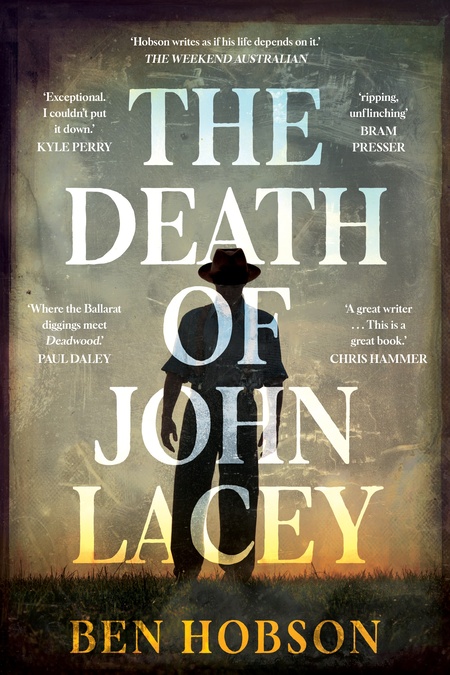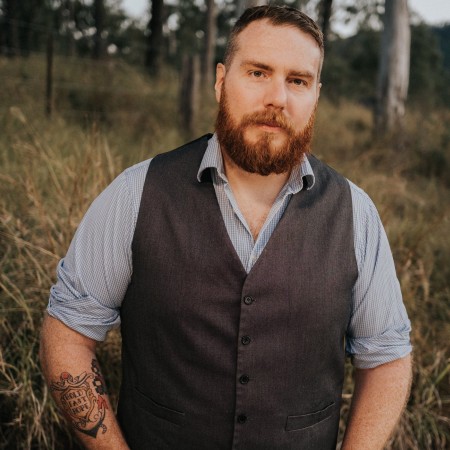Humanity loves its motherhood statements.
There’s something comforting about referring to brotherhood, mercy and justice because they sound full of virtue and goodness and the assumption is made, somewhat erroneously, that everyone knows exactly what’s meant by them.
But, like the word “love” itself, there’s often little examination of what those words really mean beyond a linguistic inner glow, with the expectation, almost always unstated, that we all know what is meant and implied by their use.
In The Death of John Lacey by superlatively good Australian author Ben Hobson (To Become a Whale, Snake Island) these terms aren’t necessarily explicitly mentioned, though their concepts are discussed by various characters as they struggle to work out how you can merciful and just in a nineteenth century Australian colonial landscape where the law is tenuous at best at times and the enactment of justice is often up to whoever is in control of the emerging urban centres, such as they are, in the Australian colonies.
What is interesting about this exploration of what these terms actually mean in boots-on-ground style is that Hobson takes a wider view than simply the usual white men colonialist perspective, bringing Australia’s Indigenous people into a thoughtful narrative discussion that wholly owns the idea that gross injustices were perpetrated the moment British colonisers seized the unceded land of Australia’s First Nations and that the lack of mercy and grace exercised here then polluted subsequent settlement of the stolen land.
Ernst stood and went back to the house, turning to regard his father one last time before closing the bark-thatched door. Edwin still sat looking over the small field with its rows of corn and potatoes. There was no telling what he was thinking.
None of this is explicitly stated since Hobson is too gifted a writer to be that clumsy in his messaging; rather he weaves various character stories together, centering on two sets of brothers, and in telling their evocatively affecting histories and present day actions, he makes it clear where everyone lies on the subject of mercy and justice, and how even brotherhood influences how these two concepts are viewed.
In the case of brothers Ernst and Joe Montague – born to two different mothers and ten years apart in age; Ernst the product of his white father’s marriage to a melancholy Scottish woman and Joe his dad’s love match with an Indigenous woman of a local clan – they have spent their life struggling to stay ahead of the curve, to carve a life out in a world seemingly inimical to their interests.
Resorting to the petty thievery that saw their dad sent to Australia as a convict, the two young men – we meet them first as children but the main story takes place in 1870 when they’re both young men – see their enforced way of life as one borne of necessity and while they understand in broad brush stroke details what is meant by justice and mercy, they are luxuries each of them can ill afford.
Their life is borne of a Darwinian need to survive, and bonded together in a way that only siblings with their backs against the wall can be, they do what must to survive, a strategy that largely pays off if they keep moving but which comes back to bite them on the proverbial in a big way when one step too far pushing the envelope of survivability brings them into grievous contact with the titular John Lacey.
Lacey is a man of brutalist intent and murderous approach who has committed terrible crimes to get to where he is as is the founder and unflinchingly cold ruler – for that is precisely what he is, and while he says the town of Lacey (yes, narcissistic naming protocols rule here) has no need of police or justice because of its supposedly paradisiacal, community-minded nature, it’s more because he will brook no interference in his autocratic jurisdiction – and who, when he encounters Joe and Ernst finds out that a reckoning comes to all men eventually.
John Lacey thinks he will triumph in this situation as he always has before, and it’s his unbridled arrogance that comes to haunt him and ultimately spells his demise – no spoilers here; the truth is in the atmospheric title – at the hands of two brothers for whom justice is earthy and immediate and with the help of townspeople including the new minister, Gilbert Delaney, who prioritise real justice and mercy over the opportunistically twisted versions beloved of self-serving men like Lacey.
The bold, epic, heartfelt and thoughtful storyline of The Death of John Lacey is really a battle between a number of ideas of what justice and mercy really mean and how where we stand in life and society influences what they actually end up meaning in actuality.
The sun was glinting through the windows of the church when Gilbert managed to return. He shut the timber door in front and placed the piece of wood across the metal latches to lock it. He made his way to the back room, hoping the trembling figure he had met those hours previously was no longer there.
Filled with a resonant meditation on what we do in the name of self interest, and how we bandy around terms like justice and mercy as cloaks of respectability and humanity when our actions don’t even met the baseline definitions, The Death of John Lacey is a beautiful novel that, harsh though its truth and realities are, nevertheless cuts right through to what it means to be truly just and to give out mercy and how this can wholly transform how we act.
Wrapped around and through this buoyantly nuanced and skillfully wrought dissection of what is commonly assumed by certain motherhood terms and what they end up being in the harsh light of self-interested day, The Death of John Lacey is at heart a story of brothers, and how the love between them defines not only how they see and interact with the world but how wider events around them come to be shaped.
Alive with some salient home truths, all sagely and movingly articulated by a writer vibrantly and rawly in touch with his writing gift and heart to an extraordinarily affecting degree, The Death of John Lacey is another compelling triumph for Hobson.
It serves up real thoughtfulness on what we mean by wholesome-sounding words that we toss around like confetti but also ruminates rewardingly on how a country like Australia, established with blood, injustice and a wholesale lack of empathy and mercy, has come to be defined by mythos and perceptions that are wholly flawed and which need the kind of ground-up rethink Hobson gives them.

